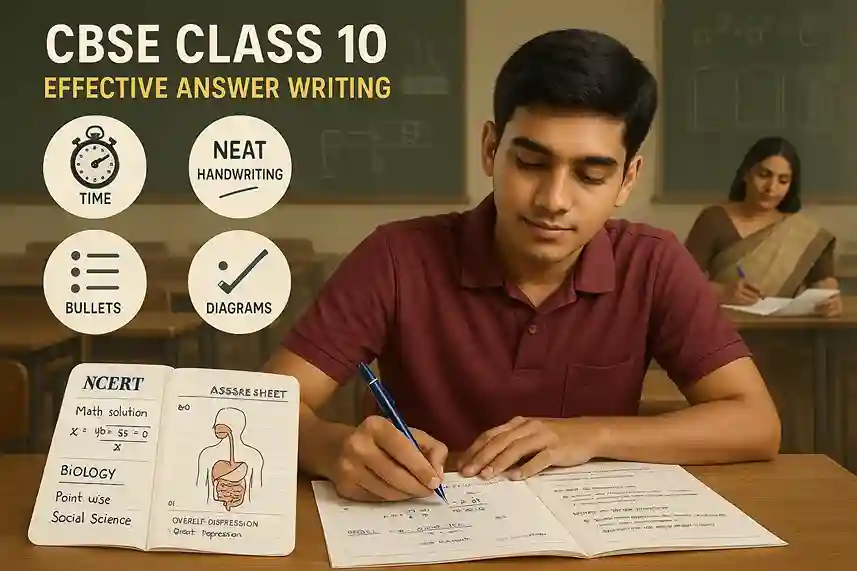Learn subject-wise strategies to write exam answers that maximize marks in CBSE board exams
Scoring high in CBSE exams requires more than knowing the answers — it’s about writing them effectively. This guide explores subject-wise strategies, examiner insights, and proven tips to help students improve presentation, clarity, and marks.

In CBSE board exams, students often know the concepts but lose marks because they do not present their answers well. Examiners evaluate hundreds of answer sheets daily, so clarity, structure, and neatness play a huge role in determining scores. A well-written answer makes it easier for the examiner to recognize the knowledge demonstrated and award full marks.
In Mathematics, examiners give step marks. Writing only the final answer without steps can cost heavily. For instance, in a trigonometry question, showing the correct identity used can earn partial marks even if the final calculation goes wrong.
Always write the formula first, then substitute values, then simplify step by step.
Science answers should be precise and supported with diagrams wherever possible. For example, if the question asks about the structure of a neuron, labeling the diagram correctly can fetch marks even if the description is slightly incomplete.
Use bullet points for processes, like steps in an experiment or functions of an organelle. Avoid writing stories — concise factual points score higher.
In English, presentation and coherence matter as much as content. When writing a literature answer, begin with a direct reference to the question, then add textual evidence or quotations, and finally conclude with your analysis. For writing tasks like letters or articles, follow the prescribed CBSE format strictly, as marks are allocated for it.
Social Science answers should combine facts with clear structure. Use maps, timelines, and flowcharts where possible. For example, if asked about the French Revolution, list key events year by year rather than narrating them in a long paragraph. This shows clarity of thought and helps the examiner award marks quickly.
Write direct and concise responses. Avoid unnecessary explanations. For instance, if the question asks, "Name the process by which plants make food," simply write "Photosynthesis."
Divide into an introduction, body, and conclusion. Use bullet points for clarity and underline key terms. For example, in a 6-mark question on democracy, begin with a definition, explain features in points, and close with its importance.
Examiners use a marking scheme issued by CBSE. They award step marks for Maths and Science, format marks for English, and content plus presentation marks for Social Science. Even if the final answer is wrong, correct steps or relevant diagrams can still fetch partial marks.
Remember, examiners want to give marks, not cut them. Make it easy for them by writing clearly.
Answer writing is as important as preparation. With the right techniques, students can maximize their potential and secure top scores in CBSE board exams. Platforms like Edzy provide structured resources such as flashcards, worksheets, and AI-powered quizzes to help students practice both knowledge and presentation effectively.

How to Prepare for the New CBSE Competency-Based Question Format
Mastering the new CBSE exam format for better academic performance

CBSE Question Paper Analysis: Trends You Must Know for 2025 Exams
Unlocking the secrets of CBSE question papers for smarter exam preparation

Top 10 Mistakes Students Make During Board Exam Preparation
Learn how to avoid common pitfalls in board exam preparation

CBSE Science Practical Exams: The Complete Student Guide
Master your CBSE Science practical exams with confidence and skill.